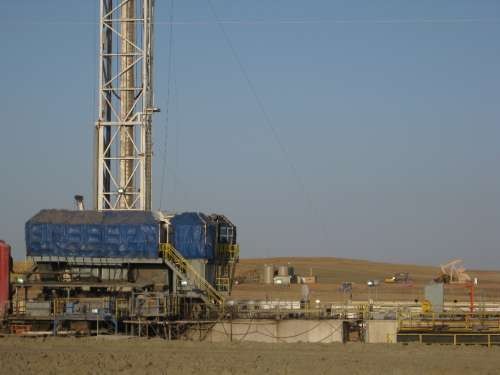
Tight Oil Boom Not the Answer to Energy Security

Oil rig in Bakken, North Dakota
Advancements in hydraulic fracturing and horizontal drilling have already unlocked vast new natural gas resources from shale rock. The enormous increase in shale gas production transformed the domestic natural gas sector and reverberated through energy markets around the world.
Drillers are using the same innovations that brought about the “Shale Gas Revolution” for oil, leading to a surge in shale oil (or “tight oil”) production. From January 2009 until April 2013 U.S. oil production jumped by 30%, rising from 5.1 million barrels per day (md/d) to 7.3 mb/d, the highest level in over 20 years. Drilling rigs have flocked to North Dakota and Texas to take advantage of the large resources there.
This has had several short-term geopolitical effects. First, by adding over 2 mb/d since 2009 – and over 1 mb/d in 2012 alone – the U.S. has provided global oil markets with a bit of breathing room. The additional supplies allowed the United States and the European Union to marshal the international community to implement sanctions on Iran. The sanctions targeted Iran’s energy sector specifically, successfully curtailing Iranian oil exports by 1 mb/d since they went into effect in 2012. Foreign investment in Iranian energy is down, the Rial is collapsing, inflation is skyrocketing, and unemployment is up.
Whether or not the economic sanctions were smart policy, and whether or not it makes the Iranian regime more or less likely to come to deal on its nuclear program, is debatable. It remains to be seen how the newly elected President, Hassan Rouhani, and the Supreme Leader will respond. What is clear is that the tight oil boom allowed the U.S. and the international community to tighten the screws on Iran without significantly raising global oil prices.
Another effect of the tight oil boom in the U.S. is the extent to which it curtails OPEC’s influence. OPEC has traditionally adjusted production quotas to influence global prices, and higher U.S. production has forced OPEC to cut back. While this has successfully prevented prices from dropping, lower production cuts into revenues for the cartel. Tight oil has also restored some spare capacity, reducing price volatility.
Despite these short-term geopolitical benefits from a surge in U.S. tight toil production, the U.S. cannot rely on oil production to deliver long-term energy security. At best, the tight oil boom will provide some breathing room as the world moves towards cleaner energy. At worst, it delays that transition by creating the illusion of long-term energy security.
The longevity of the oil boom is unknown. The productivity of many wells peaks early, and declines rapidly in the first few years.
Moreover, energy independence is the wrong goal. Oil is a global commodity – U.S. oil production only lowers oil prices to the extent that it adds to global supply. While tight oil has tempered prices somewhat, extended periods of price declines are unlikely. Even if the U.S. produces as much oil as it consumes, achieving “self-sufficiency” or “energy independence,” geopolitical events will still influence the price at the pump. There is no added security benefit simply because the gas coming out of the pump is “American.”
Finally, and perhaps most importantly, the tight oil boom threatens complacency when it comes to climate change. For supporters of action on climate change, the tight oil boom threatens to take their eye off of the ball. For policymakers who opposed action on climate change to begin with, the tight oil boom has created useful political cover. By fully embracing the tight oil boom as an unadulterated “good” thing for national security, many have used the veneer of “energy independence” to mask a failure to lay out innovative solutions to climate change.
ASP’s Perspective Paper, “The U.S. Tight Oil Boom: Geopolitical Winner or Long-Term Distraction?” goes into greater detail on the topic.






[…] Tight Oil Boom Not the Answer to Energy Security […]